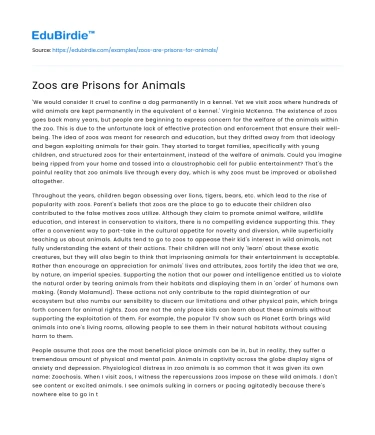'We would consider it cruel to confine a dog permanently in a kennel. Yet we visit zoos where hundreds of wild animals are kept permanently in the equivalent of a kennel.' Virginia McKenna. The existence of zoos goes back many years, but people are beginning to express concern for the welfare of the animals within the zoo. This is due to the unfortunate lack of effective protection and enforcement that ensure their well-being. The idea of zoos was meant for research and education, but they drifted away from that ideology and began exploiting animals for their gain. They started to target families, specifically with young children, and structured zoos for their entertainment, instead of the welfare of animals. Could you imagine being ripped from your home and tossed into a claustrophobic cell for public entertainment? That's the painful reality that zoo animals live through every day, which is why zoos must be improved or abolished altogether.
Throughout the years, children began obsessing over lions, tigers, bears, etc. which lead to the rise of popularity with zoos. Parent's beliefs that zoos are the place to go to educate their children also contributed to the false motives zoos utilize. Although they claim to promote animal welfare, wildlife education, and interest in conservation to visitors, there is no compelling evidence supporting this. They offer a convenient way to part-take in the cultural appetite for novelty and diversion, while superficially teaching us about animals. Adults tend to go to zoos to appease their kid's interest in wild animals, not fully understanding the extent of their actions. Their children will not only 'learn' about these exotic creatures, but they will also begin to think that imprisoning animals for their entertainment is acceptable. Rather than encourage an appreciation for animals' lives and attributes, zoos fortify the idea that we are, by nature, an imperial species. Supporting the notion that our power and intelligence entitled us to violate the natural order by tearing animals from their habitats and displaying them in an 'order' of humans own making. (Randy Malamund). These actions not only contribute to the rapid disintegration of our ecosystem but also numbs our sensibility to discern our limitations and other physical pain, which brings forth concern for animal rights. Zoos are not the only place kids can learn about these animals without supporting the exploitation of them. For example, the popular TV show such as Planet Earth brings wild animals into one's living rooms, allowing people to see them in their natural habitats without causing harm to them.
Save your time!
We can take care of your essay
- Proper editing and formatting
- Free revision, title page, and bibliography
- Flexible prices and money-back guarantee
People assume that zoos are the most beneficial place animals can be in, but in reality, they suffer a tremendous amount of physical and mental pain. Animals in captivity across the globe display signs of anxiety and depression. Physiological distress in zoo animals is so common that it was given its own name: Zoochosis. When I visit zoos, I witness the repercussions zoos impose on these wild animals. I don't see content or excited animals. I see animals sulking in corners or pacing agitatedly because there's nowhere else to go in their pitiful excuse of a habitat. No longer is the animal's well-being prioritized, the need for aesthetics and people's want to see these animals in real life became zoos' top priority. Zoos are prisons for animals, in which they camouflage their acts of cruelty with claims of conservation. They claim to preserve thousands of species when only about 15% of the animals in captivity are considered threatened. This only furthers the notion that they aren't focused on helping the animals they've confined in their concrete walls.
The zoo is not the only place animals can be seen in. Sanctuaries rehabilitate wildlife ad take in unwanted exotic pets, without breeding, buying, and selling animals as zoos do. Although zoos may have some benefits, they do not compare to places specifically catered to animal welfare such as wild animal parks, sanctuaries, or a nature reserve. In the case of wildlife reserves, animals are protected in their natural habitats. They are free to wander and live according to their wishes in a protected environment without human interference. Zoos keep animals in artificial protected habitats. Although not very free, animals get all the facilities they need with human help. This human help incapacitates them, therefore affecting any chance of survival if they were ever going to go back into the wild. If this keeps going, certain animal species will only be able to survive in captivity, going against the very nature of their existence, which is to be out in their natural ecosystem not. There are far better and convenient ways for children and even adults to learn about these animals without supporting the exploitation of them. For example, the popular TV show such as Planet Earth brings wild animals into one's living rooms, allowing people to see them in their natural habitats without causing harm to them.
In the case of zoos, many argue they side with saving animals.
As long as there is a demand for zoos, they will continue to exist. The benefits that zoos provide can be gained through more ethical methods, therefore the call for their abolition is reasonable. The zoo is an outdated concept, that commoditizes animals for entertainment. Zoos do not educate our children, nor do they protect our environment, but they are cruel institutions for the exploited animals imprisoned within them. The support of sanctuaries, nature reserves, and wild animal parks is crucial because they will not only benefit animals but our planet.






 Stuck on your essay?
Stuck on your essay?

